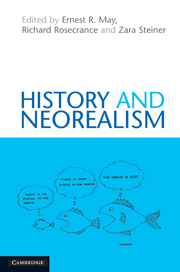Book contents
- Frontmatter
- Contents
- List of tables
- Notes on contributors
- Acknowledgments
- 1 Theory and international history
- 2 Transformations in power
- 3 Domestically driven deviations: internal regimes, leaders, and realism's power line
- 4 How international institutions affect outcomes
- 5 Not even for the seventeenth and eighteenth centuries: power and order in the early modern era
- 6 Austria-Hungary and the coming of the First World War
- 7 British decisions for peace and war 1938–1939: the rise and fall of realism
- 8 Realism and risk in 1938: German foreign policy and the Munich Crisis
- 9 Domestic politics, interservice impasse, and Japan's decisions for war
- 10 Military audacity: Mao Zedong, Liu Shaoqi, and China's adventure in Korea
- 11 The United States' underuse of military power
- 12 The overuse of American power
- 13 Redrawing the Soviet power line: Gorbachev and the end of the Cold War
- 14 Shared sovereignty in the European Union: Germany's economic governance
- 15 John Mearsheimer's “elementary geometry of power”: Euclidean moment or an intellectual blind alley?
- 16 History and neorealism reconsidered
- Index
- References
13 - Redrawing the Soviet power line: Gorbachev and the end of the Cold War
Published online by Cambridge University Press: 05 June 2012
- Frontmatter
- Contents
- List of tables
- Notes on contributors
- Acknowledgments
- 1 Theory and international history
- 2 Transformations in power
- 3 Domestically driven deviations: internal regimes, leaders, and realism's power line
- 4 How international institutions affect outcomes
- 5 Not even for the seventeenth and eighteenth centuries: power and order in the early modern era
- 6 Austria-Hungary and the coming of the First World War
- 7 British decisions for peace and war 1938–1939: the rise and fall of realism
- 8 Realism and risk in 1938: German foreign policy and the Munich Crisis
- 9 Domestic politics, interservice impasse, and Japan's decisions for war
- 10 Military audacity: Mao Zedong, Liu Shaoqi, and China's adventure in Korea
- 11 The United States' underuse of military power
- 12 The overuse of American power
- 13 Redrawing the Soviet power line: Gorbachev and the end of the Cold War
- 14 Shared sovereignty in the European Union: Germany's economic governance
- 15 John Mearsheimer's “elementary geometry of power”: Euclidean moment or an intellectual blind alley?
- 16 History and neorealism reconsidered
- Index
- References
Summary
Between 1985 and 1991, the foundation of Soviet foreign policy changed from a Marxist-Leninist view of inevitable conflict between capitalism and socialism to an idealist vision of cooperation between states in solving global problems. Mikhail S. Gorbachev fundamentally altered Soviet foreign-policy theory and practice by adopting the ideals of the New Thinking, including global interdependence, universal human values, the balance of interests, and freedom of choice. Nor was this just rhetoric; he accepted the dismantling of Soviet medium-range missiles in Europe and asymmetric reductions in Soviet conventional forces, withdrew support from communist movements, and helped mediate an end to regional conflicts in the Third World. He applied the principle of freedom of choice to Eastern Europe, culminating in his decision to tolerate the fall of communism and to acquiesce to Germany's unification. The change in Soviet identity, in how the Soviet Union viewed itself in relation to the rest of the world and its mission in international politics, brought an abrupt end to the Cold War. For many observers the most striking aspect of the new Soviet identity was Gorbachev's and his comrades' determination to discard Soviet traditional Realpolitik without substituting any moderate, reformed version of realism for it. What explains Gorbachev's adoption of an idealist view of the world and of the Soviet role within it?
Understanding the radical changes in Soviet foreign policy has both theoretical and practical significance. The Gorbachev revolution bears on the question of how states cope with a declining power position.
- Type
- Chapter
- Information
- History and Neorealism , pp. 267 - 306Publisher: Cambridge University PressPrint publication year: 2010



